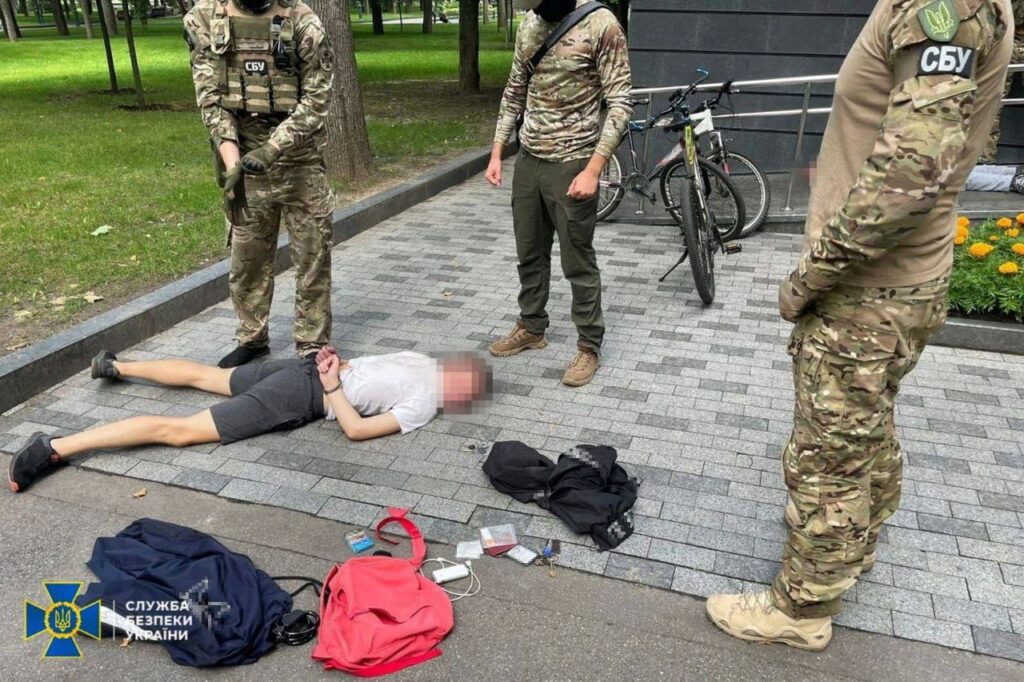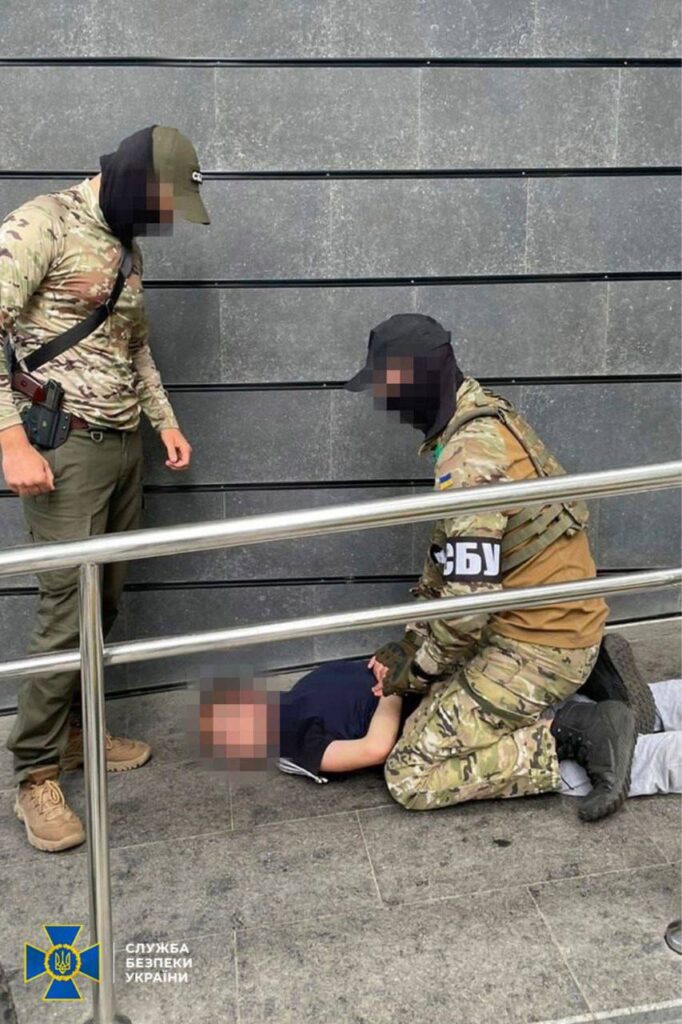In early August 2023, the SBU press service announced the arrest in Kharkiv of two young men, aged 18 and 20, who, posing as cyclists, toured the city and its suburbs to record the positions of the Ukrainian Armed Forces (UAF), marking them on Google Maps and sending the information to a handler in Russia. In May 2024, the same source stated that these young men “dreamed of making money by leaking information to the enemy and becoming FSB agents; they were recruited by Russians through ‘Russkiy Mir’ (Russian World) comments and tasked with tracking down special forces bases in the Kharkiv region; the occupiers planned to use the agents’ data to launch precision missile and bomb strikes on special forces bases.”
The young men—residents of the Saltivka district of Kharkiv—are Dmytro Pentsov and Eduard Isinov. The prosecution claims that no later than June 6, 2023 (the exact date is unknown), a member of the 1st Department of the FSB’s Counterintelligence Operations Department, “responsible for recruiting Ukrainian citizens for subversive activities,” contacted Dmytro via the Telegram messenger. Only a nickname was used on the Telegram account. The alleged FSB officer’s name and position remain unidentified; at least, this information wasn’t provided to the court. Therefore, the identity of the person who contacted Pentsov is unverified, and the notion that it was an (unspecified position) officer of the 1st Department of the FSB’s Counterintelligence Operations Department is purely speculative.
Having agreed to cooperate with the unidentified individual, Pentsov, no later than June 26 (the exact date is also unknown), suggested that Isinov collect data on the UAF with him, and Isinov agreed. According to the investigation, from July 3, 2023, to August 1, they cycled, photographed UAF deployments, fortifications, bunkers, and minefields, and sent everything to the same unidentified individual via Telegram. There were four trips: July 3, July 11, July 21 (the strangest trip, as they allegedly received instructions to “gather information on the location of the Tsyrkunova military administration using the corresponding coordinates,” but how many locations for a village administration in Tsyrkunova are there?), and August 1, which deserves separate discussion. For each data transmission, Pentsov and Isinov received $50 USD to their Ukrainian bank cards. The cards are attached to the case file, but the court was not provided with transaction details—the origin and sender of the funds remain unknown.
During interrogation, Pentsov and Isinov claimed they were simply cycling and did not collect any information. According to them, on August 1, at noon, they were detained near a public toilet in Kharkiv’s Shevchenko Park by unidentified individuals in camouflage, who struck them in the chest and pushed them to the ground.

The protocols attached to the case file as evidence may shed light on the situation.
On July 20 (immediately before the strange assignment in the village of Tsyrkunova), the SBU gained access to the phones of the friends. After this, they were placed under surveillance, and everything happening in Tsyrkunova was recorded. The protocol states that upon arriving in the village, Pentsov and Isinov parked their bicycles near the “Posad” shop at 10:05 AM and began observing the military personnel and equipment. Then they approached the soldiers who had driven into the shop’s parking lot, spoke to them for about two minutes (why weren’t these soldiers summoned to court to testify?), and sent someone what appeared to be an SMS. After examining the phone, it turned out that it wasn’t an SMS but a Telegram message sent to an “unidentified person among Kharkiv residents,” not an FSB officer. Who received the message and its contents were not established in court. There is no mention that it contained data about the UAF.
On July 21, at 1:28 PM, the cyclists arrived at the local Golden Tour hotel, met some military personnel there, asked them something (these soldiers were also not called as witnesses), and rode on. Later, while cycling down the street, the friends, as stated in the case materials, made movements with their mobile phones as if they were taking photos and videos of administrative buildings, including those with military vehicles parked nearby.
By 1:43 PM, the cyclists approached the treeline behind the village council’s military administration building, circled the building, and continued on. At 2:01 PM, they returned to the “Posad” shop and exchanged messages with someone for several minutes. At 2:12 PM, Pentsov went into the shop, bought a bottle of beer, and the friends drank beer, periodically looking at their phones. At 2:19 PM, they headed towards Kharkiv. At 2:25 PM, the cyclists stopped near the “Ekwator” shopping center, remaining there until 3:37 PM, “performing actions with their phones that resembled photo and video recording.” Then they separated, cycled along different streets, met at the bridge over the Kityarchyn Yar, reached V. Zubenko Street, and took out their phones while passing a fire station. That’s all.
The main point to note from the results of July 21 is that the friends were not detained, despite the surveillance of their suspicious activities. On July 25, the SBU gained remote access to Pentsov and Isinov’s phones and only managed to establish that they corresponded with an “unidentified person among Kharkiv residents.” Why they weren’t detained and their recordings (if any) and recipients checked remains unclear.
So, there is still no evidence that the friends received an assignment from an FSB officer regarding the village of Tsyrkunova.
The next protocol details the surveillance on August 1. From approximately 7:00 AM, Pentsov and Isinov cycled for half an hour through Kharkiv’s central streets, then stopped at the “Allo” store on Sumskaya Street, “performing actions with their phones that resembled a correspondence, as if describing the situation.” How it was determined that they were describing a situation is unknown. From 8:11 AM to 8:51 AM, the friends cycled separately and “performed actions with their phones that resembled the photo and video recording of buildings with military vehicles parked nearby, periodically stopping and looking at their phones.” Around 9:00 AM, they met in Shevchenko Park, stayed there for about 40 minutes, and repeated their tour of the same blocks. At 10:05 AM, the friends returned to the park, sat on a bench near the fountain, and started doing something on their phones.
The indictment will state that Pentsov and Isinov collected information on the locations of the GUR’s forces and assets that day. However, such claims should be supported by a request to the GUR and a corresponding response confirming that forces were indeed located at the specified addresses at that time and date. No such evidence exists.
At 12:00 PM, the young men were arrested in the park near a public toilet, after which strange events occurred. Unfortunately, we lack precise data, but the defendants’ lawyer requested that the protocol of the public toilet inspection be deemed inadmissible evidence, as “the investigator was present but did not conduct a search.” What the (SBU operatives?) were doing in the toilet, considering that the friends were arrested on a bench outside, is unclear. However, according to the inspection protocol, some personal belongings of the accused were found in the toilet. Apart from their mobile phones and bicycles, nothing else was confiscated from Pentsov and Isinov at that time (they didn’t have anything else). Does this mean the mobile phones were found in the toilet?

On August 30th (after their friends were already in custody), the SBU examined one of the confiscated phones and found a message exchange. Everyone immediately assumed it was a conversation with an unidentified FSB officer, but the previous protocols state that the contact was a resident of Kharkiv. The entire conversation solely concerns August 1st; there is absolutely no mention of the three trips in July – no assignments regarding the village of Tsirkuny, no sent photos or videos, nothing at all. Instead, the messages say:
- “We’re on site awaiting further instructions. A contact will send the video shortly.”
- “Good work today brothers. There’ll be bonuses.”
- “Thanks, we gave it our best.”
- “Still awaiting next assignment.”
- “Standing by – taking a smoke break for now.”
- “About 20 minutes.”
- “Video marker showing two vehicles.”
This is followed by a forwarded Google Maps screenshot and a screenshot of a conversation where the brothers agree to join the FSB Academy of the Russian Federation in the future. This is the only place where the FSB is even mentioned.
Let’s summarize:
- There is no mention in the case of any ‘Russian world comments’ that allegedly led to FSB recruiting the friends. While such comments themselves constitute a criminal offense, no such charges were brought.
- There isn’t a single piece of evidence showing the defendants corresponded with an FSB officer – the case contains neither a name, nor position, nor any data that would confirm this person worked specifically in the 1st Service of the DKRO.
- Moreover, one protocol states the friends were corresponding with a ‘resident of Kharkiv’. Since when do FSB officers live in Kharkiv?
- According to the prosecution, the friends made four trips to collect data, but evidence of collection and transmission was provided only for the last trip – on the day of their arrest.
- The prosecution claims the friends received an assignment regarding Tsyrkuny village, but there’s no correspondence with such an assignment, nor any messages that could be interpreted as recruitment.
- Surveillance of the friends began at least on July 21, yet they weren’t arrested until early August, despite their alleged information gathering in Tsyrkuny.
- No military personnel whom the friends supposedly spoke with while collecting information in Tsyrkuny were called as witnesses.
- During the arrest, SBU officers (without an investigator) allegedly found some ‘personal belongings’ of the friends in a public toilet near the arrest location. The lawyer protested, but the court ignored him. Only mobile phones and bicycles were officially seized, meaning the items found in the toilet were precisely the phones.
- Then, one of the detainees’ phones suddenly contained correspondence with an unidentified person about information transfer, dated August 1. Before this date (before SBU officers directly accessed the phone in the public toilet), there was nothing.
- The FSB connection is ‘confirmed’ solely by the friends’ expressed intention to join the FSB Academy in the future. Given the above, there’s reason to doubt whether Penzov and Isinov actually wrote those messages.
- The court wasn’t presented with bank transaction records showing the defendants allegedly received $50 after each completed mission.
- Not a single missile or bomb struck any of the locations the friends visited
This case lacks evidence of intelligence gathering on the Ukrainian Armed Forces, or if such evidence exists, it was not presented to the court. There is also no confession, something often obtained in such cases by promising the accused a shorter sentence or a plea bargain. However, there are serious doubts about whether the case might have been an SBU provocation. Nevertheless, the court found the extremely serious crime of high treason committed by prior conspiracy by a group of persons under martial law (Part 2, Article 111 of the Criminal Code of Ukraine) to be proven. On May 10, 2024, the young men were sentenced to 15 years imprisonment with confiscation of all property.
This translation was made using a neural network. If you find any inaccuracies, please contact us.


